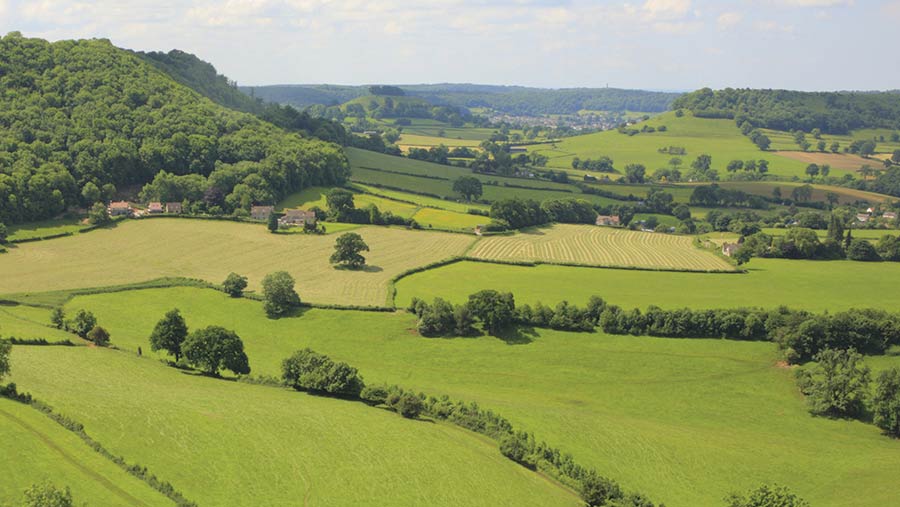Practical advice for tenants buying their farms
Numbers are hard to get hold of, but anecdotally more tenants are seeking advice and finance to purchase farms and land.
While no figures are collected centrally, the Tenant Farmers Association’s recommended professionals are recording more activity on surrenders and purchases than usual, says chief executive George Dunn.
The AMC has also experienced a rise in enquiries for loans by tenants looking to buy their holdings.
Regional agricultural manager for North Wales and the Midlands Andrew Connah has seen such applications double over the past year.

© Richard Becker/FLPA/imagebroker/Rex/Shutterstock
While loan applications for this purpose usually form around 5% of all those received, they amounted to more than 10% in this region in 2016.
See also: Changing market could lead to more tenancy surrenders
Mr Connah puts this down to county councils selling holdings across North Wales and in the West Midlands as well as some significant estates being broken up in the East Midlands.
There has also been a handful of smaller farm sales across the patch.
“The rise in farmland values over the past decade has in many cases not been matched by increased rental income – particularly on older succession tenancies – and as such landlords now see a poorer return on the capital invested,” he says.
“So landowners facing large capital expenditure or inheritance tax (IHT) bills could be tempted to cash in their land.”
Land agents say that the rise in farmland values has tempted some landowners to take the chance to reorganise or broaden their portfolio.
“We have certainly seen a rise in tenants being offered the chance to buy their farms, whether that then translates into tenants actually buying and whether our experience is indicative of a more nationwide trend is difficult to say,” says Philip Meade, of Davis Meade Property Consultants, Shropshire.
The higher level of interest by tenants is for a variety of reasons, says Mr Meade, who is also a Tenant Farmers Association adviser.
“My view is that landlords are cashing in on the high value of land at a time when they can then put the money into assets with a better return, even FBT rents only tend to give a return of about 1-2% whereas (for example) buy to lets and commercial property have a much better return.”
Solicitor Tom Devey, a partner with FBC Manby Bowdler, says has seen a big increase in sales to tenants.
“This is due in part to trustees and institutional landowners reviewing their positions and deciding that due to the huge increase in land values in recent years, now is the time to rebalance portfolios and dispose of holdings which are subject to long-term tenancies especially if those tenancies are regulated by the Agricultural Holdings Act 1986.
“Many local authorities are also being forced into selling holdings to try and raise finance to plug the hole caused by the government’s austerity measures,” says Mr Devey, who is also based in Shropshire.
What issues should tenants be aware of when buying farms and land?
 Philip Meade, land agent, Davis Meade Property Consultants, Shropshire
Philip Meade, land agent, Davis Meade Property Consultants, ShropshireDiscount to vacant possession value
The level of discount a tenant should be able to secure below vacant possession value depends on several factors including age, type of tenancy, likelihood of succession and the landlord’s position.
A farm subject to a lifetime tenancy can typically make 60-70% of the vacant possession (VP) value on the open market. Conversely, if the farm is particularly attractive or the tenant is elderly and unlikely to have a successor, then the sale price could be 80% or more of the vacant possession value.
To get a farm at 60% of VP these days, the tenant would probably need to be in his forties and with children who may at some stage succeed themselves.
Where the current tenant is say 65 and there is another succession to go, the discount will depend on whether a son or daughter looking to succeed is in a good position to do so.
If they have been working on the farm since leaving school for example, and are not married to a high-flying executive earning far more than the farm income, then I would hope that the tenant would get at least a 25% discount.
If the tenant is not in a position to buy, he can either sit tight and get a new landlord if the farm is sold or try and negotiate compensation to leave.
Beware of restrictions
Some sales to tenants have clauses attached – for example a clawback (of a proportion of the uplift in value) in the case of the grant of planning permission for a use other than for agriculture, or the land being sold for development, or a share of profits if the land is resold (at full agricultural values) within a certain timeframe.
It’s better to agree a realistic vacant possession value with a fair discount without these clauses included as they can otherwise cause problems for borrowing and resale.
However, if there are such clauses, purchasers should ensure that such terms are clear and in particular check whether the clauses will be applied to planning permission for the owner’s own use, for example solar panels or an extension to the farmhouse.
Landlords selling may try and impose certain conditions other than clawback, for example a restriction on the type of land use, buildings or further housing. The extent of this varies – often it is the institutional or publicly-owned landlords (such as county councils) who insist on such provisions as they have (or may have) auditors to answer to.
If the landlord insists on them, then we have to take them into account in the valuation and negotiations as in turn this will probably have an impact on the ability to borrow some of the money to buy the farm.
Dilapidations and tenant right, fixtures and fittings
Unless the farm is in a really poor state or the tenant has spent huge amounts on fertiliser and feedstuffs (the basis for tenant right) then very often it is agreed that one cancels the other.
Although in reality these figures will rarely if ever be identical, the professional fees in working them out and negotiating them often makes it not worthwhile.
Tenant’s fixtures and improvements (buildings etc) are a different matter and should be accounted for in the valuation.
Borrowing
Well-known lenders such as AMC and the high street banks have been very receptive to tenant’s inquiries although the built-in equity of such a deal is no longer enough on its own.
Remember that while the mortgage payments may start off far higher than the rent, in 20 years’ time the repayments will probably be the same but the rent could be a lot higher.
Affordability is the key, so even if you are being offered the chance to buy a farm worth £2m for £1.5m, you will still have to show you can afford the repayments. The best solution, if this is an issue, is to agree a plan with the lender that involves selling some of the land to reduce the loan.
Important paperwork and considerations
The surrender needs to be properly documented and timing of the termination of the tenancy can also be important from a practical, valuation and tax perspective. Also, be aware of others whose rights you might be affecting such as farm workers, especially if they live in a cottage that is on the tenancy.
 Tom Devey, partner with solicitor FBC Manby Bowdler, Shropshire
Tom Devey, partner with solicitor FBC Manby Bowdler, ShropshireTenants looking to buy their farm should be aware that mineral and sporting rights are not always included in such a sale and it may be owned by a third party.
However, if they do belong to the owners of the freehold then it’s preferable to have them included in the purchase.
Sporting rights exercised by a third party could raise potential issues with crop damage, livestock worrying and occupiers’ liability, as well as future sale value and ease of marketing.
Equally, mineral rights may not allow somebody to come and excavate on the land but they could mine under it, leading to ground stability problems.
Another concern arises if planning permission is granted to develop the land. You may have to pay compensation to the owners of sporting and mineral rights in respect of any impact the development would have upon their ability to exercise those rights.
It is very important to see and understand the exact wording and implication of such rights over the land – a misunderstanding can not only be expensive but very stressful and time consuming, possibly putting on hold a development which may be crucial to the future of the business and the family.
 Roy Jackson, partner, accountant Whittingham Riddell, Shropshire
Roy Jackson, partner, accountant Whittingham Riddell, ShropshireStamp Duty Land Tax (SDLT)
Budgeting for SDLT is important when considering the purchase of a farm that is moving from a tenancy to freehold.
If a single purchase consists of both residential and non-residential property, it will be subject to non-residential SDLT rates.
Based on a purchase price of £1m, this represents an additional cost of £39,500. Beyond this value, the charges rise substantially and can be as high as 5% for farms and land.
Tenants buying farms may be caught by a rule which can impose a 3% SDLT surcharge on the purchase cost of a second residential property (for example a tenant may already own a house separate from the farm, bought for retirement and currently let out).
This is triggered when there is an acquisition of a major interest in a single dwelling by an individual and when four conditions are met:
- A — The chargeable consideration is £40,000 or more.
- B — On the effective date of the transaction the dwelling is not subject to a lease with an unexpired term of more than 21 years.
- C — At the end of the day that is the effective date of the transaction, the purchaser has a major interest in another dwelling that satisfies conditions A and B.
- D — The dwelling is not a replacement for the purchaser’s only or main residence.
There are however certain exemptions and planning options. In particular, mixed use transactions, (purchase of residential and non-residential properties together) in a single transaction, may represent a non-residential transaction for SDLT purposes. In such cases the 3% surcharge may not apply if the purchase is structured correctly and so this aspect should be considered with tax and legal advisors.
VAT traps
Further consideration should also be given to VAT, where interests in property can be standard rated, zero-rated, exempt or outside the scope of VAT, depending on its nature.
In certain cases if VAT is charged on the sale, the SDLT is also chargeable on VAT element so this may increase the purchase cost by around a further 1%.
It is therefore best to consult with your tax advisers before entering into any agreements, to ensure that all tax planning options are considered, well in advance of moving towards exchanging of contracts.
 Mark Griffiths, director with accountant Dyke Yaxley, Shropshire
Mark Griffiths, director with accountant Dyke Yaxley, ShropshireCapital Gains Tax (CGT) is often a concern of tenants buying their holdings at a discounted value.
A tenant will usually acquire the farm at undervalue because of his or her status as a sitting tenant, creating a potential capital gains tax liability should they sell at any point.
However, if they don’t sell and continue to farm the land, then the gain will not be crystallised and no tax will be payable.
Should they continue to hold the land until death, the gain will be extinguished and the beneficiaries will acquire the land through the estate, with a CGT uplift to current market value.
On death, the agreed probate value becomes the new base value for the individual inheriting the property.
So, post death, the land or farm could be sold pretty much CGT-free (there may be a small uplift in value between death and ability to sell) and with the existing IHT rules, IHT free.
If, as is often the case, a tenant can’t afford to buy and retain the entire holding outright, so intends to buy at a discounted price then sell-on part of the holding at full agricultural value (to reduce overall borrowings), they need to recognise that a capital gains tax liability will develop.
So they should consult their tax advisor at an early stage, who may be able to advise on the structure of the purchase to reduce the tax liability on the subsequent partial sale.
Structuring borrowings
Tenants buying their farms or land should explore their options and consider what they are really looking to do with the land and properties being purchased.
As with all debt, look at the farm’s ability to secure and service the debt; the discount to the tenant should help ensure that the bank is secured, as they will look to secure on the freehold with the farmer purchasing at tenanted value.
Always look to stress-test the ability of the business to service the debt at 5%, or at least 2% above their current offer. If the budget can deal with this, then the farmer should have the ability to fund future rises without any significant changes to the business.
Next, consider if there is a long-term intention to keep the farm and another generation to farm in the future, then explore both fixed and variable options for debt.
Despite a small rise in the last four months in the costs of long-term money, long-term debt is still very cheap.
If the intention is to sell some or all of the property in the short to medium term, be more careful around fixed rates due to penalties for early redemption.
You may look at fixing some and leaving part on variable rate to give the farmer the flexibility to repay some early, while obtaining some protection against interest rate rises.
Those looking to churn the farm and use the purchase to fund retirement should look for variable rates with penalty-free repayments in order to cash in on the discount.
Families may want to consider life assurance, particularly for younger family members, to protect the ability to repay debt or cover IHT liabilities.
The need for this depends very much on individual family and business circumstances, also on whether the lender makes it a condition of the borrowing. In such cases, remember the loan should not be conditional on taking the cover offered by the lender – take advice and shop around.
 Andrew Connah, AMC regional agricultural manager, North Wales and the Midlands
Andrew Connah, AMC regional agricultural manager, North Wales and the MidlandsIt is understandable that those borrowing large sums often want to settle the debt as quickly as they can.
But the counterside of this is that borrowing over as long a period as possible will minimise monthly commitments.
The best of both worlds could be to take on a longer term loan (thereby minimising monthly repayments) while ensuring the flexibility is retained to repay early (to minimise the overall interest costs of borrowing the money).
The agreement has to suit the unique circumstances of the individual business, but there are more options than many may realise.
For example, borrowing £750,000 at current interest rates and repaying over 30 years rather than 20 would reduce repayments by around £1,000 a month.
Taking out a loan on an interest-only basis would reduce monthly charges by around £2,000, when compared with a 20-year repayment loan. Lower monthly repayments mean you can put your business cashflow – and yourself – under less stress when times are difficult, and free up cash to invest elsewhere or pay off the capital faster when times are good.
The benefits of this approach were borne out in 2016 when interest-only loans gained popularity against a backdrop of low commodity prices and tight cashflows.
While borrowing on an interest-only basis may seem less attractive to some, it can be an appropriate form of finance with the ultimate repayment of capital coming from known future capital sales or capital introductions into the business.
Tenants buying farms – what to watch out for
- Restrictive clauses in sale terms – either clawing back uplift in value when planning permission is granted for use other than agriculture, or a portion of any subsequent sale value, or restrictions on the way you farm or develop the land
- Timing could be crucial in light of tax, valuation and other considerations – could be important for both landlord and tenant
- Try to make sure mineral and sporting rights are included in the sale – complications may result otherwise. If not included, ensure you see the paperwork and understand what those rights entail
- CGT is likely to be an issue if you have to sell part of the farm to fund the purchase – it may be possible to structure things to minimise this or avoid it with careful planning
- Don’t forget to budget for SDLT – it can add up to 5% to the purchase price
- VAT could be an issue – not often associated with farm sales but will significantly to the cost and also push up the SDLT bill
